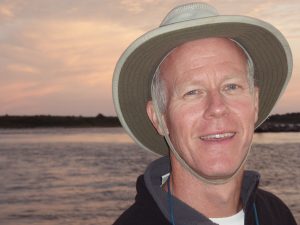Staff Profile
Scott Lindell
Preferred Name: Scott Lindell
Research Specialist
Applied Ocean Physics & Engineering
Email: slindell@whoi.edu
Phone: 508 289 2358
Office: Redfield Building
Address:
Woods Hole Oceanographic Institution,
Mail Stop 34
266 Woods Hole Road
Woods Hole, MA 02543
Lab/Group Site: https://www2.whoi.edu/site/lindell-lab/
Research Statement
My primary interest is marine aquaculture research for sustainably providing food and fuel. I strive to develop methods that have positive ecosystem services and minimal negative social and environmental impacts. My research and development program demands a multi-disciplinary approach encompassing various subsets of biology (e.g. genetics, physiology, epidemiology), and oceanographic engineering (e.g. sensing, structural, systems). My projects typically address practical problems and opportunities encountered by commercial enterprises, and involve both commercial and academic partners, and often involve consultation with resource managers and policy makers.
Research Interests
Automation of Marine Farms – monitoring and management
The development of autonomous platforms for sensing, monitoring and managing marine farms will be a major breakthrough especially for facilitating expansion offshore. Offshore marine farming usually requires larger investment and more frequent monitoring than nearshore, which must be offset by low-cost, low labor automated and remote methods. For example, Autonomous Underwater Vehicles (AUV) and Autonomous Surface Craft (ASC) platforms can be configured with sensors to assess water quality, biomass quantity and quality, and structural integrity (e.g. to detect possible gear damage or entanglement), and relay that information in real time through various means of communication.
Engineered designs can contribute significantly to lowering operating and management costs associated with marine aquaculture. I intend to work more closely with WHOI developers of low-cost sensors and platforms for deploying them to address offshore farm monitoring needs. Permits for offshore farms may require regular weekly surveys to verify the integrity of the structures, a task that could be automated on an AUV or ASC. Other useful sensors for aquaculture include detection of HABs, shellfish larvae (in preparation for collecting them on settling ropes), fluorescence for measuring algal stress and photosynthetic efficiency, and water quality parameters such as nitrate and ammonium. While not directly a part of my funded research, I will be assisting Erin Fischell and her team who will be using an AUV to monitor my research seaweed farm in Nantucket Sound, and to compare AUV measurements with the conventionally derived measurements my team will collect.
Another arena that is ripe for development of autonomous platforms and sensors is offshore mussel farming. This is a highly productive and expanding sector of the shellfish culture industry in New England and California. As production of domestic blue mussels in the U.S has increased to 7 million pounds (about 5% of imports) future expansion is being pushed to less protected sites (further offshore) where greater space is available and user conflicts are less. Longline mussel culture has become the leading method of mussel farming in most regions of the world due to lower capital costs, and more efficient mechanized methods that can be applied to its simpler design. However, there is one “Achilles heel” when it comes to growing mussels along the Atlantic or Pacific migratory duck flyway. These ducks love to eat mussels and federal law protects them.
Identifying humane and sustainable duck deterrence techniques that can be implemented as part of a farm’s long term management plan are a top priority to ensure the continued expansion of East and West Coast blue mussel aquaculture industry. Lindell and cooperators have crafted a proposal to implement ASCs as a means of deterring ducks from mussel farms but are still seeking the right funding source.
Developing superior cultivars of aquaculture stocks
Aquaculture breeding and selection is a recent phenomenon compared to extant agricultural practice of hundreds or thousands of years. A long-term research interest of mine has been the selection of naturally superior strains for aquaculture, and I will continue that with a recent ARPA-E award I lead. Using the novel engineered farms as a platform for hundreds of test plots, I will be responsible for coordinating the selection of a founding population of sugar kelp germplasm, designating crosses and families to be planted out, and evaluating the performance (phenotypes) of each family. I will coordinate with a team of USDA/Cornell geneticists who will develop a reference genome and the latest high-throughput gene sequencing technology to identify relationships between the traits I measure and the genetic variation they measure. Such knowledge could enable predictive powers for creating superior crosses and cultivars that we will test in successive generations’ growth trials. This initial project has triggered discussions with our partners to seek funds for similar work to improve blue mussel genetics and aquaculture.
